Several studies on mental and physical health in relation to political ideologies have identified a significant gap between those people on the right, who are often called conservatives, versus the left who are associated with liberals.
Over two decades of supporting research has shown overwhelmingly that left-wingers or liberals tend to more often suffer from mental illness than right-wingers or conservatives.
This may surprise some people, but it shouldn’t because there is a lot of research showing that conservatives tend to be more grounded than liberals. They are less likely to be neurotic or psychotic, healthier, and happier than their counterparts on the left.
Liberalism has been found to be associated with higher levels of neuroticism (anxiety and emotional instability), social desirability, and self-esteem. Conservatives were more likely to be conscientious (high levels of self-discipline), whereas liberals were more likely to be open-minded, curious and creative.
The American Psychiatric Association’s Diagnostic and Statistical Manual of Mental Disorders (DSM) defines psychotic individuals as having “distorted thinking” and “grossly disorganized behavior.” In other words, their thought processes are irrational and disordered.
A person with psychosis may experience delusions (false beliefs) or hallucinations (seeing something that is not there). Psychotic disorders include schizophrenia, bipolar disorder, major depression with psychotic features, schizoaffective disorder and schizophreniform disorder.
According to Pew Research Center survey published in March 2020, white liberals/Democrats are much more likely to have been diagnosed with a mental health condition compared with their moderate and conservatives peers. This poll showed that mental health conditions varied considerably by race, even in the “very liberal” category.
The studie’s author, Zach Goldberg, had published study’s info in a set of visuals and posted them to a thread on Twitter.
The difference is much more pronounced in the younger female aged category of 18 to 29-year-olds, with the highest percentage at a whopping 56%.
Here is an example of Pew Research statistics of young women diagnosed with a mental condition:
56% of young white liberals
28% of young white moderates
27% of young white conservatives
Here are the statistics of young men diagnosed with a mental condition:
34% of liberal/Democrat men
22% of moderate men
16% of conservative men
A recent study from the University of Pennsylvania found that conservatives were more likely to be happier and satisfied with their lives compared to liberals. The study also found that conservatives were more likely to have higher levels of well-being than liberals.
The study concluded that the difference in well-being was due to political ideology rather than demographics such as income or education level. It also found that this difference was most prominent in younger adults who were still forming their political ideologies.
Another study conducted by Duke University showed that liberals were more likely to experience depression than conservatives, and that they also had higher rates of suicide attempts as well.
Also, political conservatives are happier, healthier, and stronger than liberals. A 2012 study found conservatives score higher than liberals on personality and attitude measures that are traditionally associated with positive adjustment and mental health, including personal agency, positive outlook, transcendent moral beliefs, and generalized beliefs in fairness.
Several studies show conservatives believe more in cultural traditions of a developed society along with individual freedom combined with individual responsibility, a limited government, economic opportunity, strong national defense (and in-group preservation), and belief in a transcendent moral order.
In contrast, liberalism is based upon beliefs in progress, equality, tolerance, and pluralism in matters of morals, religion, and politics, and see government as a vital instrument for solving social injustice (Brooks, 2010; Chambers, Baron, & Inman, 2006; Hunter, 1992; Lakoff, 2002).
A 2019 political psychology study found that people with conservative political attitudes tend to have better physical health than their liberal counterparts (Chan, 2019).
In 2020, a study found that political ideology may also be relevant to mental health, as people who are more liberal, especially those identifying as “extremely liberal,” are more likely to have mental health problems.
The researchers found that these mental health issues on the Left were not just compared to conservatives, but also with those identifying as “liberal” or “slightly liberal.” This tendency for mental illness was more pronounced for people who identified as “extremely liberal,” who were reported to be worse off on several metrics.
However, the study found that those who identified as “extremely conservative” had comparable levels of mental health to those identifying as “conservative” and “slightly conservative.” Conservatives also reported being happier than liberal groups.
Another 2020 study investigated a large pool of adult Americans to see whether there was a relationship between political ideology and mental health. The researchers found a strongly elevated risk for mental illness among the extreme liberals (+150%), a small increase among the liberals and slightly liberals (+29 to 32%), and somewhat lower rates among conservatives and extreme conservatives (-17 to 24%).
Researchers in Brittain found people with clinical symptoms of anxiety disorders tend to express higher concerns about economic inequality and the environment, according to new research published in the International Journal of Psychology. The findings indicate that anxiety symptoms are slightly more common among those with a leftist worldview in Great Britain.
“It’s no wonder that researchers have been interested in the underpinnings of political orientation for so long,” said study author Vilja Helminen (@vilja_h), a doctoral candidate at the University of Helsinki.
“But a lot of the studies have focused on how individuals self-identify on a liberal-conservative continuum. So, we were interested in what goes on behind those labels, how threat sensitivity in the form of anxiety disorder symptoms is related to a wider range of political attitudes.”
Other studies have shown that while both conservatives and liberals experience stress, conservatives are better able to cope with stress than liberals, who tend to become depressed or anxious when facing difficult situations.
GNOSTIC WARRIOR CONCLUSION
It doesn’t take a psychiatrist to understand that some people in American culture suffer from mental illness. In fact, it is very common with nearly one in five U.S. adults living with a mental illness, which equates to 52.9 million people in 2020. This number must be much higher in 2022.
What that means is that when you walk down the street, 1 in 5 people you encounter are mentally ill. Now, we know that these people tend to be attracted to the left and liberalism.
There are several reasons why this may be so:
Conservatives tend to have stronger religious beliefs than liberals do, which gives them a sense of meaning in life and a sense of belonging that helps them cope with difficult situations.
Liberals often lack these things because they reject traditional religious beliefs and lack the support networks provided by church members who help one another through difficult times.
Conservatives are more likely to marry and stay married than leftists are, which provides them with another source of support during difficult times as well as social support for their ideas and beliefs from their spouse or partner. This is particularly true for men since men tend to be more active in politics than women do (although women have been getting more active recently).
I also believe that a major part of this problem is at U.S. universities because it is well-known that academics lean extremely to the left (especially in the softer fields), and show high rates of mental illness (Duarte et al., 2015; Kinman & Wray, 2013; Langbert, 2018).
Studies have also reported higher rates of mental illness among college students and PhD students in particular with a higher suicide rate (Levecque et al., 2017; Puthran et al., 2016; Rotenstein et al., 2016; Twenge et al., 2010).
This would help exacerbate the problem of mental health in younger liberal adults who are being influenced through the education system.
These findings above prove that there is a link between liberal political ideologies and mental health problems.
In recent years, there has been a rise in the number of people identifying themselves as liberals or leftists and also culture wars between the left and the right.
This can be attributed to a number of factors, including the increased acceptance of LGBTQ+ people, women and minorities in society; however, it is also mainly due to a growing prevalence of mental illness among this group and it is only getting worse by the year.
SOURCES:
Barry R. Schlenker a, John R. Chambers a, Bonnie M. Le b (2011) Department of Psychology, University of Florida, Gainesville, Florida, United States Department of Psychology, University of Toronto, Ontario, Canada
Chan, E. Y. (2019). Political orientation and physical health: The role of personal responsibility. Personality and Individual Differences, 141, 117–122. https://doi.org/10.1016/j.paid.2019.01.005
EOW Kirkegaard · 2020 MENTAL ILLNESS AND THE LEFT
Clinical symptoms of anxiety disorders as predictors of political attitudes: A prospective cohort study Vilja Helminen,Marko Elovainio,Markus Jokela First published: 13 August 2021 https://onlinelibrary.wiley.com/doi/full/10.1002/ijop.12796
Other sources listed above or linked to

Moe is the founder of GnosticWarrior.com. He is a father, husband, author, martial arts black belt, and an expert in Gnosticism, the occult, and esotericism.

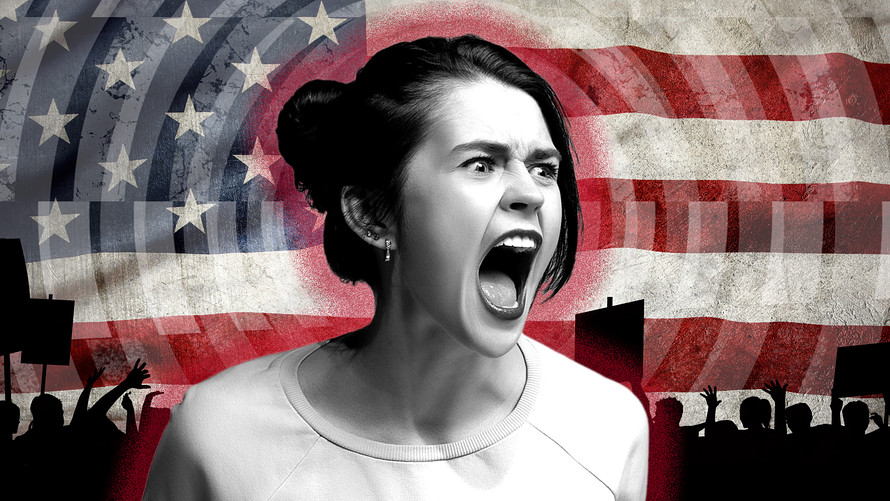
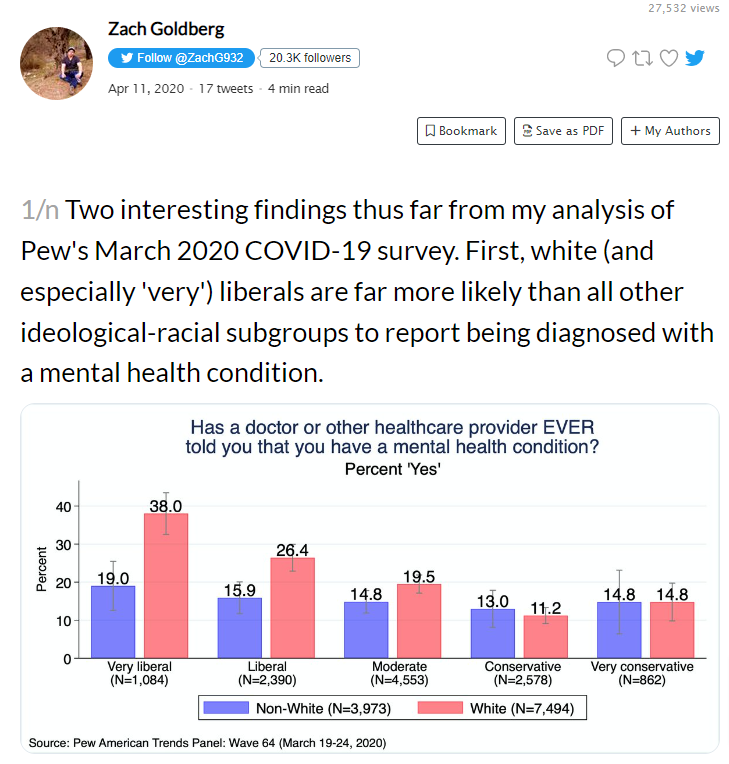
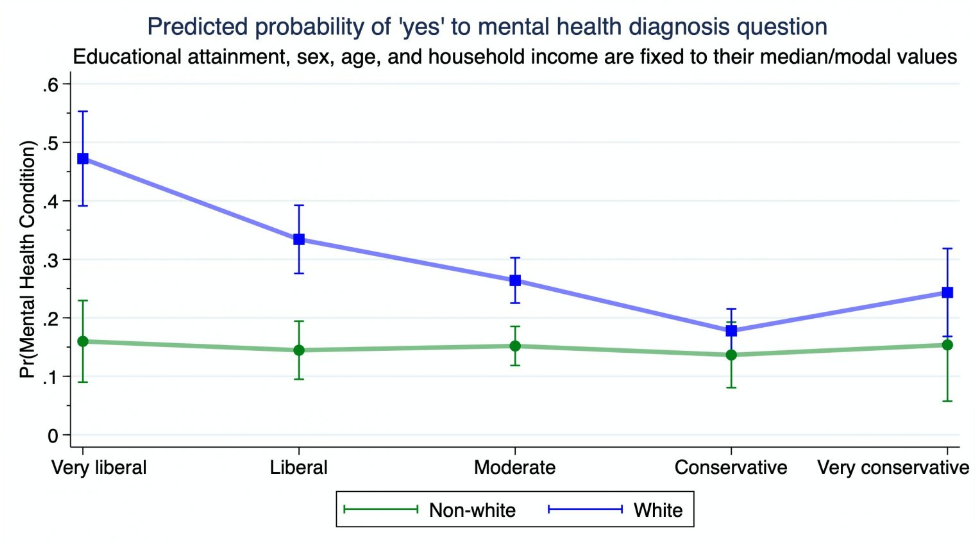

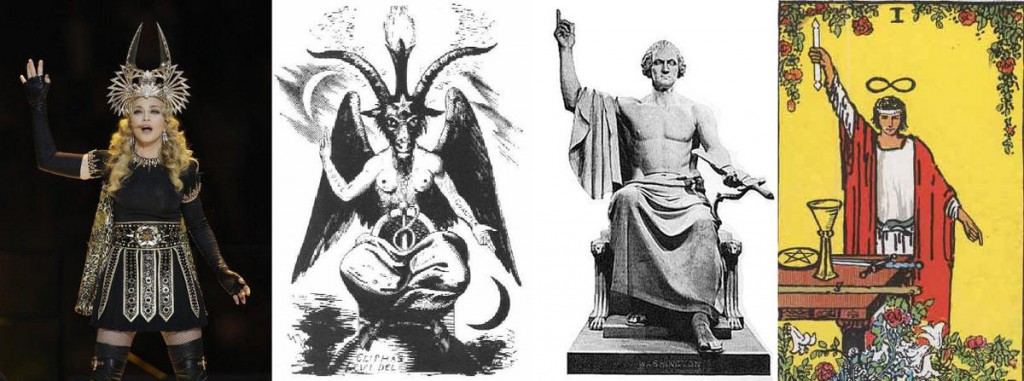
![How Bishop Colman, having left Britain, built two monasteries in the country of the Scots; the one for the Scots, the other for the English whom he had taken along with him [667 A. D.] | Book 4 | Chapter 4 How Bishop Colman, having left Britain, built two monasteries in the country of the Scots; the one for the Scots, the other for the English whom he had taken along with him [667 A. D.] | Book 4 | Chapter 4](https://www.gnosticwarrior.com/wp-content/plugins/contextual-related-posts/default.png)


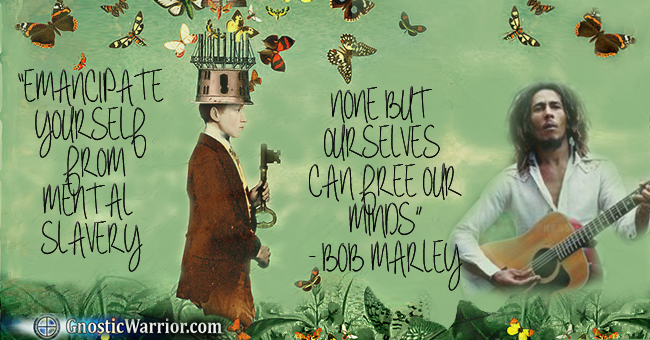

Well, shit. I’d -like- to be conservative but I’m afflicted by an overburdening sense of empathy that makes it impossible to go through a day without some major worry or concern about a person/group/situation that has nothing to do with me. Not sure if pathological empathy is a diagnosable condition but it’s certainly responsible for a lot of my mental health issues.
But likewise without it I wouldn’t be writing music or painting pictures so. You win some lose some. I was kinda hoping for some sort of conclusion to this article that might suggest some sort of method to bridge the gap but it ended rather bluntly. Most of your work I find leaves me feeling uplifted or at least open to a possibility or path I’d never considered; which is quite impressive. Been reading for years, every article has had a lasting impact on me and several have been bookmarked for reference for as long as I can remember
Hello Nigel,
Thank you for sharing your ideas and kind words. This article is meant to be a series of essays detailing the history of political ideologies and the differences between their meaning in the past up until today. When you study this history you realize that much of our modern definitions have changed or have tilted towards the extreme on each side of the political divide. Hence the terms “Far Left and Far Right.”
For example, being a liberal today is much different than what it means to be a Libertarian in the traditional sense as it relates to what the founding fathers of our country had envisioned. They believed that all freedom should be tempered by reason, logic, God and the common good of everyone.
That is why today the Far Left are referred to as Neo-liberals who have taken the Libertarian idea of personal freedom to the extremes of moral and ethical conduct to the point they say screw reason, to hell with logic and F god for their own selfish ideologies that do NOT take into account the common good of their country and their communities. It is all about them and their feelings i.e. emotions, which equates to irrational and child like behavior that as adults is considered to be a mental illness.
If you do not identify with these Far Lefters, but you are on the Left, that means this characterization does not apply to you and you should maybe consider educating some of these Far Lefters about these historical and scientific facts, If they refuse to listen, at least direct them to the nearest psychologist to get checked out before they hurt someone or themselves.